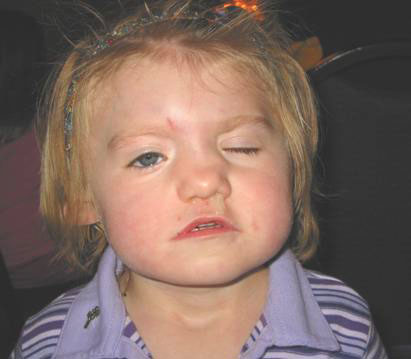CHARGE Syndrome
Danielle Mercer1, Fern Tsien2, and Barbara Gordon-Wendt1
1 Department of Communication Disorders, LSUHSC School of Allied Health Professions
2 Department of Genetics, LSUHSC School of Medicine
The incidence rate of CHARGE syndrome is 1 in 10,000. CHARGE syndrome consists of many different features. It was named for what were considered to be the major features of the disorder:
Coloboma of the eye (hole in the iris, retina, choroids, macula, or disc)
Heart defects
Atresia of the choanae (narrow or blocked passages from the back of the nose to the throat)
Retardation of growth or development
Genital and/or urinary abnormalities
Ear abnormalities and deafness
In addition to these, other common features are absent or diminished sense of smell, swallowing difficulties, and facial palsy. Most patients have some deformities of the ear, such as asymmetric ears, small or absent earlobes, malformed middle ear bones, malformed cochleae, and small or absent semicircular canals. Most patients have hearing loss, which can vary from mild to profound. Conductive, sensorineural, or mixed hearing loss may occur, and the hearing loss may be progressive. Other common features of CHARGE syndrome include cleft lip or palate, kidney abnormalities, esophageal atresia, and tracheo-esophageal fistula. A gene causing CHARGE syndrome was just identified in 2004, but only about 2/3 of patients test positive for this gene defect. Because of this, diagnosis is still mostly made based on clinical features. Inheritance of the gene is autosomal dominant, but most cases are due to new mutations. In these cases, neither parent carries the defective gene, and the syndrome arises sporadically. It is recommended parents of affected children still receive genetic testing because there are a small number of cases where the defective gene was passed on from one of the parents.
For more information on CHARGE syndrome, visit the following links:
http://www.chargesyndrome.org/
http://ghr.nlm.nih.gov/condition/charge-syndrome
For information on support groups for CHARGE syndrome, visit the following links:
http://www.chargesyndrome.org/
http://www.dailystrength.org/c/CHARGE-Syndrome/support-group
http://www.familyvillage.wisc.edu/lib_chgs.htm

Child with CHARGE syndrome
From www.chargesyndrome.org
